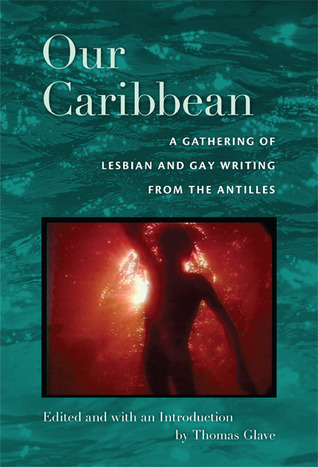
Out on Main Street: And Other Stories
Shani Mootoo
Short stories
1993
Synopsis: Sawnet
Review

Tante Merle
E. Erica Doyle
Short story, Fiction
1999
Anthologized in Our Caribbean: A Gathering of Lesbian and Gay Writing from the Antilles (ed. Thomas Glave).
Full text: http://www.blithe.com/bhq3.1/3.1.4.html
Excerpt
“One day I come by fruit vendor woman. My paper just come through immigration, my sister sponsor me come live in United State take care of she miserable Yankee children.
“‘Well,’ I say. ‘This the last morning I coming here, for tomorrow I leaving on big ship to New York City go live with my sister.’
“Fruit vendor woman look up at me she eyes burning. She take me in, she breathe me out, she drink me like coconut water. She speak first time.
“‘You know,’ she say, ‘it hard to be fruit vendor these days. They does have all kind of new shop downtown; and each shop does have it own particular fruit; and each fruit does have it own particular seed; and each seed does have it own particular need; and each need does find it own particular root. Each soil, rootless, does have it own particular sorrow. It hard to be fruit vendor on the savannah.’
“She take me mango, slice it as ever still wind blowing slow, slow, slow. Sweat starting to crowd me brow. She bangles tinkle in the wind as she cut with machete slicing through to the seed.
“How I savor that mango that day, yes?”
Tante Merle stop. Tante Merle eyes looking past me, past me. Looking far into the past and the distance. Tante Merle feeling hummingbird wing beat on she face. Smelling orchid growing in front yard. Not hearing rain pounding down on Brooklyn street.
“Is good, girl, you,” she say. “It hard to be fruit vendor.”

Faizal Deen
Young Faggot
Faizal Deen
Poetry
2003
Anthologized in Our Caribbean: A Gathering of Lesbian and Gay Writing from the Antilles (ed. Thomas Glave).
For a discussion of this poem and Glave, see: The People Who Are Not Even Really People, by Lotusgurl

Land Without Chocolate: A Memoir
Faizal Deen
Memoir, Poetry
2000
Publisher’s Synopsis: Land without Chocolate is Faizal Deen’s startling first book of poetry. This book is a potpourri of delight, bursting with resonances of Peter Pan, Bob Dylan, Jamaica Kincaid, Toni Morrison and Shakespeare. The author’s description of the gay culture in both his native and adopted countries is at once subtle and outright. The entire memoir is permeated with the fragrances and flavours of the country of his birth and childhood.

In Another Place, Not Here
Dionne Brand
Novel
1996
Synopsis: Elizete lives on an unnamed Caribbean island and has worked the cane fields from morning to night for as long as she can remember. Given to a virtual stranger by a birth-family that could not bear another mouth to feed, she has had a life of hardship and deprivation mediated by occasional small kindnesses. Verlia, another Caribbean-born woman, fled the islands for Canada at 17 and has spent 18 years among left-wing activists hoping to foment social change. Both women share profound feelings of dislocation and disillusion, and for a brief instant when Verlia travels to Elizete’s island to participate in an incipient revolutionary effort, the two find solace in each other. – Eleanor J. Bader


The Dispossessed
Clement Maharaj
Novel
1992
Synopsis: This first novel grew from the world of indentured sugar plantation workers. Arriving from India in 1917, their labor and the labor of future generations made their island rich but left them poor, far from home, and despised by native islanders. From the guaranteed work on the estates, the laborers were forced to move on, to survive in a hostile world not knowing where the next day’s bread would come from. (Barnes & Noble)
All Decent Animals
Ooyna Kempadoo
Novel
2013
Synopsis: Loyalties, love, conflicting cultures, and creativity come into play as Ata, a young woman working in carnival design but curious about writing, and her European boyfriend, Pierre, negotiate the care of their friend Fraser, a closeted gay man dying from AIDS. The contradictory Trinidadian setting becomes a parallel character to Fraser’s Cambridge-derived artistic sensibility and an antagonist to Ata’s creative journey. (Amazon.com)

Cereus Blooms at Night
Shani Mootoo
1996
Publisher’s Synopsis: Cereus Blooms at Night, writer and artist Shani Mootoo’s first novel, was a finalist for several of Canada’s most prestigious literary awards, including the Giller Prize and the Ethel Wilson Fiction Prize. Tyler, the narrator of this multigenerational novel, is a gay male nurse at a residential home in Paradise, a town on the amazing fictional island of Lantanacamara. Tyler’s favorite charge is the notorious Mala Ramchandin, whose past is as rich and mysterious as the island setting. Through dialogue and flashback Tyler learns of the colonialism and racism, love and envy, betrayal, incest, death, abandonment, and lesbian escape that are part of the complicated Ramchandin family history.